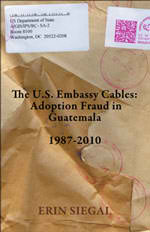I finished reading Dani Shapiro’s newest memoir, Inheritance, and highly recommend it. Here’s a one-sentence plot summary: “A 54-year-old writer takes DNA test on a whim and discovers the father who raised her is not her biological father.”
Dani was conceived with donor sperm in the 1960s, at a clinic in Pennsylvania. At the time, donor sperm was mixed with sperm of the father, and Dani’s parents (both deceased) never knew whose sperm created Dani. The story told to Dani was that her parents had trouble conceiving, and visits to a clinic fixed that. The donor himself was promised anonymity. He may or may not have other donor-created children out in the world currently.
The memoir is especially timely because of our cultural moment, when DNA kits are available and cheap. As I’ve noted previously, we in the adoption community have dealt with family complexity for years, but for most people, the information that a parent is not blood related comes as a life-upending shock.
The Inheritance narrative reads like a detective yarn as Dani, her husband, and the genealogy experts they consult unravel her history. Throughout, Dani poses ethical questions about what a person who is donor-conceived has a right to know regarding her biology. But as she points out, such questions are becoming increasingly irrelevant as anyone can spit in a vial and discover unknown parents, brothers, and sisters. The implications of this reality are far-reaching.
To me, as an adoptive parent, the equally compelling question is addressed in the memoir’s parallel thread: the question of identity. Dani wrestles with identity on every page. Who am I, really? she wonders. Who am I if not the person I thought I was, if my story is different from the one I believed? Who is my ‘real’ father? What does being a father mean?
“Who am I really?” is the question asked by many people who are adopted. And on some level, the question never goes away. Answers evolve over a lifetime.
Inheritance is one of the most probing, insightful, beautifully written explorations of the meaning of family and identity I’ve every read. Chapter by chapter, Dani puts the reader right beside her as she comes to terms with her new truth: from denial and anger to understanding and acceptance. Inheritance is not written specifically about “adoption,” but its reflections will resonate with the adoption community. Dani loved the father who raised her and demonstrates a profound, driving need to know her birth father. Both these statements are true, and worth pondering.
Inheritance also offers much to think about to anyone who is donor-conceived or considering donor conception. Thought leaders in the fertility industry should be required to read Inheritance.
I’ll leave you with two quotes. The first is said by Dani’s ninety-plus -year-old Aunt Shirley, and the second by Dani’s friend and colleague, Rabbi David Ingber.
“Finding all this out is a door to discovering what a father really is. It isn’t closure—you may not get to have that—but it’s an opening to a whole new vista.” (p. 138)
~Aunt Shirley
“You can say, ‘This is impossible, terrible.’ Or you can say, ‘This is beautiful, wonderful.’ You can imagine that you’re in exile. Or you can imagine that you have more than one home.’” (p. 209)
~Rabbi David Ingber




 ShareThis
ShareThis
